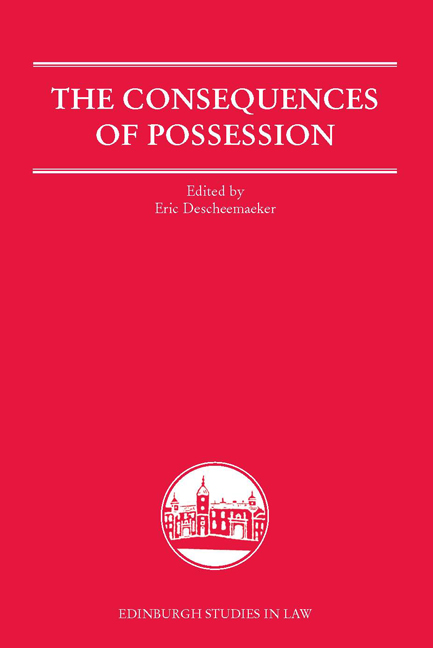Book contents
- Frontmatter
- Contents
- Foreword
- List of Contributors
- Table of Cases
- Table of Statutory Materials
- 1 The Consequences of Possession
- 2 Why Protect Possession?
- 3 Is Possession Factual or Legal?
- 4 Possession as a Source of Property at Common Law
- 5 The Evolution of Possessory Actions in France and Italy
- 6 The Protection of Possession in Scots Law
- 7 Possessio civilissima in Spanish and German Law: Protecting Possession between Fact and Fiction
- 8 Possession of Incorporeals
- 9 The Protection of Quasi-Possession in South African Law
- Index
7 - Possessio civilissima in Spanish and German Law: Protecting Possession between Fact and Fiction
Published online by Cambridge University Press: 07 December 2017
- Frontmatter
- Contents
- Foreword
- List of Contributors
- Table of Cases
- Table of Statutory Materials
- 1 The Consequences of Possession
- 2 Why Protect Possession?
- 3 Is Possession Factual or Legal?
- 4 Possession as a Source of Property at Common Law
- 5 The Evolution of Possessory Actions in France and Italy
- 6 The Protection of Possession in Scots Law
- 7 Possessio civilissima in Spanish and German Law: Protecting Possession between Fact and Fiction
- 8 Possession of Incorporeals
- 9 The Protection of Quasi-Possession in South African Law
- Index
Summary
Death is a unique event in life and offers serious challenges for the bereaved. The law therefore dedicates special attention to this unique circumstance since death leads to several legal problems. In the law of possession, a specific challenge is determining what happens to possession once a person has passed away. Is there anything mystical like possession beyond death? Is there a way for an heir or a beneficiary to protect possession once the testator is deceased?
At the moment of death, actual control vanishes; likewise any intention of using one's belongings. Clearly the impact of death on possession law depends on how possession is defined. If we agree to understand possession as material and visible control over an item (corpus) combined with the intention to control (animus), death will lead to a situation where belongings remain without a possessor. Hence, death causes a lack of possession until the heir or beneficiary gains actual control over the items that make up the deceased's estate. Leaving aside the issue of adverse possession, this can lead to the following problem: before an heir or a beneficiary has intentionally gained actual control, a third party can wrongfully detain personal items or invade land belonging to the estate. Thus, a lack of possession makes the deceased's estate vulnerable to dispersal leading to a situation which is likely to erode the heir's economic position and to undermine the defunct's will. Additionally, having actual control over the estate is crucial to the heir since in Spanish and German law he or she has to administer it, unless the testator has appointed an executor. So a lack of possession not only endangers the proper administration of the estate, but can also seriously jeopardise the defunct's will.
Spanish and German law master the vacancy of possession by referring to possessio civilissima. They establish that an heir possesses the deceased's belongings right after the death without further ado. Therefore, neither actual control over the defunct's items (corpus) nor any intention to control (animus) is required. Furthermore, the heir does not even need to know about his or her heirship. In German law, this kind of non-material possession is called Erbenbesitz (Bürgerliches Gesetzbuch, § 857) while Spanish legal scholars name it posesión civilísima and link it to Código civil, art 440.
- Type
- Chapter
- Information
- The Consequences of Possession , pp. 141 - 170Publisher: Edinburgh University PressPrint publication year: 2014



